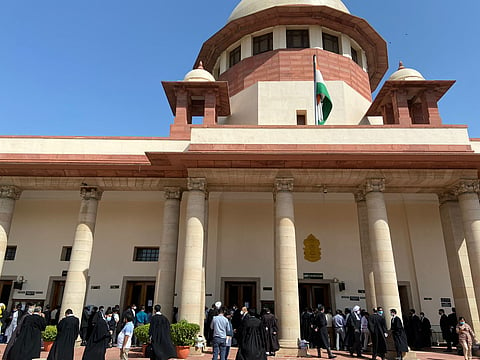

THE Supreme Court Saturday took a serious view of the deteriorating air quality in the national capital and directed the Central Government and the Delhi Government to apprise it of the emergency measures they have taken to bring down the AQI (Air Quality Index) levels. A special bench of Chief Justice of India(CJI) N.V. Ramana and Justices D.Y. Chandrachud and Surya Kant was hearing a plea by 17-year-old Delhi student Aditya Dubey concerning rising levels of air pollution in the National Capital Region (NCR).
The hearing of the case saw unusual concern by the bench to drive home its view that the situation is very serious.
"We have been forced to wear masks at home also, the situation is very serious", CJI N.V. Ramana remarked, as if it was all that could goad the executive to take effective steps to mitigate the poor quality of the air. He suggested to the Solicitor General Tushar Mehta to impose two days lockdown in the capital to bring down the level of air pollution, again unmindful of the consequences of the lockdown for the livelihood of the daily labourers, who are looking forward to a normal life, in the aftermath of the Covid fears subsiding substantially. The prospect of a two-day lockdown, if suddenly declared, is likely to lead to uncertainty in the job market and in the life of migrants in the NCR, as many would apprehend that the lockdown may be extended, if the air quality does not improve as expected.
The hearing also saw a debate between the bench and the counsel on the reasons for sudden spike in air pollution in the NCR, with the Solicitor General Tushar Mehta, inclined to attribute it to stubble-burning in Punjab, a Congress-ruled state.
The submission did not find favour with the CJI who replied "Why are you projecting like (the) pollution is because of farmers? It is only a certain percentage of pollution. What about the rest? What are you doing to control the pollution in Delhi?
Mehta was quick to clarify that he was not blaming farmers. "Stubble burning may be one of the factors in air pollution, but not the only factor", he added.
Justice Chandrachud intervened and said, "If farmers don't get an incentive, a change is unlikely. Despite subsidy, many farmers are not able to buy machines for stubble burning".
Justice Chandrachud also took strong exception to the opening of the schools in the midst of deteriorating air quality.
"Schools have opened after Covid19. Little children are going to school at 7 am. Delhi Government is exposing the lives and lungs of little children to grave pollutants. Schools are in your jurisdiction", Justice Chandrachud told senior advocate Rahul Mehra, who appeared for the Delhi Government. Again, the bench appeared oblivious of the consequences of a prolonged closure of schools for children, who have been waiting to be free from the compulsions and limitations of online learning, imposed by the pandemic.
When Mehra sought to mention the issue of stubble burning, Justice Kant interjected and said "Now it has become a fashion to bash the farmers whether its Delhi govt or someone else. There was a ban on firecrackers but what has been happening in the last 8 days? What is the Delhi police doing", asked Justice Kant.
While the bench agreed to adjourn the hearing till Monday, it appeared as though the Supreme Court has to keep the pressure on the Centre and the states to act to control air pollution. Only on October 28, the Supreme Court, while hearing the same case, had directed Mehta to "take necessary steps towards control of the pollution". On the same day, the court had directed the Delhi Government to file an affidavit detailing the steps being taken by it. Mehta too was directed to share a copy of the Centre's affidavit and status report with the other side immediately. In the midst of deteriorating air quality in Delhi, it was, therefore, amusing to find the Centre pleading for more time so that it could convene a meeting of the Chief Secretaries of the concerned States on Saturday to address the situation and discuss emergent measures to be taken to bring down the pollution.
The hearing on Monday is likely to see more admonition by the bench and less action on the ground. Last year, on October 16, both Punjab and Haryana told the Supreme Court that they had developed an App which could help in identification and notification of the particular field in which someone has burnt stubble. Not inclined to monitor the measures being taken by the states to control stubble burning, the Supreme Court had accepted the suggestion of the petitioner's counsel, Vikas Singh that a former Judge of the court, who is aware of the problem (namely, Justice Madan B.Lokur) be appointed to monitor the situation in Punjab, Haryana, Uttar Pradesh and NCR of Delhi. The Lokur Committee, however, was still-born, with the Supreme Court bench, led by the then CJI, S.A.Bobde, agreeing with the Centre's stand that it was not required and that it would come up with legislation which could satisfy its concerns.
The hearing on Saturday showed that the bench perhaps missed an opportunity to grill the Centre about its unfulfilled promises it had made to the court during the hearing of the case last year.